
THE VOICE OF INTERNATIONAL LITHUANIA
|
VilNews has its own Google archive! Type a word in the above search box to find any article.
You can also follow us on Facebook. We have two different pages. Click to open and join.
|
About VilNews
- Posted by - (7) Comment
How to access all our 18
sub-sections here in VilNews
Click on the links below to access each of VilNews' 18 sections. All our sections have their own distinct, different contents, as the headlines suggest. You can also scroll forward to new pages by clicking NEXT at the bottom of each page. We hope you have time to study our many articles!
- Bookmark :
- Digg
- del.icio.us
- Stumbleupon
- Redit it
- Posted by - (5) Comment
VilNews is back!
Our publication VilNews has been inactive over the past two years. But here we are again, ready with a fresh new issue. We wish old and new readers worldwide warmly welcome!
“New” VilNews consists of 18 sections that you can immerse yourself into by clicking on the link buttons at the top of each page.
If “old” VilNews had been printed on paper, it would become a book of more than 7,000 pages of totally unique reading material about historical and contemporary Lithuania. This huge material is still available. All old and new articles are sorted by topics, in our 18 sections.
The VilNews concept is a unique combination of informative articles, social media (blogs and commentaries) and background articles about Lithuanian people, history, culture, politics, tourism, economy and much more. We do very much appreciate feedback and comments from our readers.
I wish you some good reading, and please do not hesitate to contact us!
Say what you mean – mean what you say – don`t be mean
Aage Myhre
Editor-in-Chief
aage.myhre@VilNews.com
- Bookmark :
- Digg
- del.icio.us
- Stumbleupon
- Redit it
- Posted by - (5) Comment

The term Fourth Estate refers to the press,
both in its explicit capacity of advocacy
and in its ability to frame political issues.
VilNews was several years ago established as a newsletter for Vilnius International Club (founded 2001). Over the years, the newsletter got attention and readers from a worldwide audience far beyond the spheres of the
Against this background, it was in September 2010 decided that VilNews should be separated from the club and established as a separate corporation and publisher, with the aim to turn the newsletter into an online e-magazine with a broad scope of issues and coverage.
Today's vision for VilNews is to develop and maintain an e-publication that should be viewed as a good, strong, independent, democratic and outspoken Fourth Estate media in and for Lithuania, founded on professional journalism and reflected comment articles.
VilNews as e-magazine shall continue the line of the newsletter, to be critical of the negative that is still going on in this country, while increasingly trying to find positive stories and interesting angles on events and characteristics from both past and present. Another goal is that VilNews shall
VilNews has got amazingly great support and response from readers around the world. This fact makes us confident that we will continue to develop VilNews' position
- Bookmark :
- Digg
- del.icio.us
- Stumbleupon
- Redit it
- Posted by - (5) Comment
VilNews code of ethics
Each of our editors and editorial staff members are required to be familiar with these ethical standards, and to base their practice on this code. The ethical practice comprehends the complete journalistic process from research to publication.
1. The Role of the Press in Society
1.1. Freedom of Speech, Freedom of Information and Freedom of the Press are basic elements of a democracy. A free, independent press is among the most important institutions in a democratic society.
1.2. The press has important functions in that it carries information, debates and critical comments on current affairs. The press is particularly responsible for allowing different views to be expressed.
1.3. The press shall protect the freedom of speech, the freedom of the press and the principle of access to official documents. It cannot yield to any pressure from anybody who might want to prevent open debates, the free flow of information and free access to sources. Agreements concerning exclusive event reporting shall not preclude independent news reporting.
1.4. It is the right of the press to carry information on what goes on in society and to uncover and disclose matters, which ought to be subjected to criticism. It is a press obligation to shed critical light on how media themselves exercise their role.
1.5. It is the task of the press to protect individuals and groups against injustices or neglect, committed by public authorities and institutions, private enterprises, or others.
2. Integrity and Responsibility
2.1. The legally responsible editor carries personal and full responsibility for the material contained in the publication, no matter the form.
2.2. Each editorial desk and each employee must guard their own integrity and credibility in order to be free to act independently of any persons or groups who - for ideological, economic or other reasons - might want to exercise an influence over editorial matters.
2.3. Members of the editorial staff must not accept commissions or offices, financial support or dual roles creating conflicts of interest in relation to their editorial tasks. Be open on matters that could influence the credibility of editorial staff members.
2.4. Members of the editorial staff should not use their position to achieve personal gains.
2.5. A member of the editorial staff cannot be ordered to write or do anything, which is contrary to his or her convictions.
2.6. Reject any attempt to break down the clear distinction between advertisements and editorial copy. Advertisements intended to imitate or exploit an editorial product, should be turned down, as should advertisements undermining trust in the editorial integrity and the independence of the press.
2.7. Never promise editorial favours in return for advertisements. The material is published as a result of editorial considerations. See to it that the vital distinction between journalism and commercial communication is being maintained upon employment of web links and other connective means.
2.8. It is a breach of good press conduct to let sponsorship affect editorial activity, contents and presentation.
2.9. Members of the editorial staff may not accept assignments from anyone but the heads of the editorial staff.
3. Journalistic Conduct and Relations with the Sources
3.1. The source of information must, as a rule, be identified, unless this conflicts with source protection or consideration for a third party.
3.2. Be critical in the choice of sources, and make sure that the information provided is correct. It is good press practice to aim for diversity and relevance in the choice of sources. If anonymous sources are used, or the publication is offered exclusivity, especially stringent requirements must be imposed on the critical evaluation of the sources. Particular caution should be exercised when dealing with information from anonymous sources, information from sources offering exclusivity, and information provided from sources in return for payment.
3.3. Good press conduct requires clarification of the terms on which an interview is being carried out. This also pertains to adjacent research.
3.4. Protect the sources of the press. The protection of sources is a basic principle in a free society and is a prerequisite for the ability of the press to fulfil its duties towards society and ensure the access to essential information.
3.5. Do not divulge the name of a person who has provided information on a confidential basis, unless consent has been explicitly given by the person concerned.
3.6. In consideration of the sources and the independence of the press, unpublished material as a main rule should not be divulged to third parties.
3.7. It is the duty of the press to report the intended meaning in quotes from an interview. Direct quotes must be accurate.
3.8. Changes of a given statement should be limited to corrections of factual errors. No one without editorial authority may intervene in the editing or presentation of editorial material
3.9. Proceed tactfully in journalistic research. In particular show consideration for people who cannot be expected to be aware of the effect that their statements may have. Never abuse the emotions or feeling of other people, their ignorance or their lack of judgment. Remember that people in shock or grief are more vulnerable than others.
3.10. Hidden cameras/microphones or false identity may only be used under special circumstances. The condition must be that such a method is the only possible way to uncover cases of essential importance to society.
3.11. The press shall as a rule not pay sources or interviewees for information. Exercise moderation when paying a consideration for news tips. It is incompatible with good press practice to employ payment schemes designed to tempt people, without due cause, to invade the privacy of others or to disclose sensitive personal information.
4. Publication Rules
4.1.Make a point of fairness and thoughtfulness in contents and presentation.
4.2. Make plain what is factual information and what is comment.
4.3. Always respect a person's character and identity, privacy, race, nationality and belief. Never draw attention to personal or private aspects if they are irrelevant.
4.4. Make sure that headlines, introductions and leads do not go beyond what is being related in the text. It is considered good press conduct to reveal your source when the information is quoted from other media.
4.5. In particular avoid presumption of guilt in crime and court reporting. Make it evident that the question of guilt, whether relating to somebody under suspicion, reported, accused or charged, has not been decided until the sentence has legal efficacy. It is a part of good press conduct to report the final result of court proceedings, which have been reported earlier.
4.6. Always consider how reports on accidents and crime may affect the victims and next-of-kin. Do not identify victims or missing persons unless next-of-kin have been informed. Show consideration towards people in grief or at times of shock.
4.7. Be cautious in the use of names and photographs and other clear identifiers of persons in referring to contentious or punishable matters. Special caution should be exercised when reporting cases at the early stage of investigation, cases concerning young offenders and cases in which an identifying report may place an unreasonable burden on a third party. Identification must be founded on a legitimate need for information. It may, for instance, be legitimate to identify someone where there is imminent danger of assault on defenceless individuals, in the case of serious and repeated crimes, if the identity or social position of the subject is patently relevant to the case being reported on, or where identification protects the innocent from exposure to unjustified suspicion.
4.8. Reporting on children, it is considered good press conduct to assess the implications that media focusing could cause in each case. This also pertains when the person in charge or parent, has agreed to exposure. As a general rule the identity of children should not be disclosed in reports on family disputes or cases under consideration by the childcare authorities or by the courts.
4.9. Be cautious when reporting on suicide and attempted suicide. Avoid reporting that is not necessary for meeting a general need for information. Avoid description of methods or other matters that may contribute to provoking further suicidal actions.
4.10. Exercise caution when using photos in any other context than the original.
4.11. Protect the credibility of the journalistic photograph. Photos used as documentation must not be altered in a way that creates a false impression. Manipulated photos can only be accepted as illustrations if it is evident that it in actual fact is a picture collage.
4.12. The use of pictures must comply with the same requirements of caution as for a written or oral presentation.
4.13. Incorrect information must be corrected and, when called for, an apology given, as soon as possible.
4.14. Those who have been subjected to strong accusations shall, if possible, have the opportunity to simultaneous reply as regards factual information. Debates, criticism and dissemination of news must not be hampered by parties being unwilling to make comments or take part in the debate.
4.15. Those who have been the subject of an attack shall have the chance to reply at the earliest opportunity, unless the attack and criticism are part of a running exchange of views. Any reply should be of reasonable length, be pertinent to the matter and seemly in its form. The reply can be refused if the party in question has rejected, without an objective reason, an offer of presenting a contemporaneous rejoinder on the same issue. Replies and contributions to the debate should not be accompanied by polemic editorial comment.
4.16. Beware that digital publication pointers and links could bring you to other electronic media that do not comply with the Ethical Code. See to it that links to other media or publications are clearly marked. It is considered good press conduct to inform the users of interactive services on how the publication registers you, and possibly exploits your use of the services.
4.17. Should the editorial staff choose not to pre-edit digital chatting, this has to be announced in a clear manner for those accessing the pages. The editorial staff has a particular responsibility, instantly to remove inserts that are not in compliance with the Ethical Code.
The VilNews Code of Ethics are identical with the:
CODE OF ETHICS OF THE NORWEGIAN PRESS
Ethical Code of Practice for the Press (printed press, radio, television and net publications). Adopted by the Norwegian Press Association November 23th, 2007.
- Bookmark :
- Digg
- del.icio.us
- Stumbleupon
- Redit it
- Posted by - (7) Comment
As long as VilNews exists,
|
DR. IRENA VEISAITE, CHAIRWOMAN OF THE VILNEWS HONORARY COUNCIL
|
Professor Irena Veisaite, Chairwoman of our Honorary Council, has asked us to convey her heartfelt greetings to the other Council Members and to all readers of VilNews.
“My love and best wishes to all. As long as VilNews exists, there is hope for the future,” she writes. Irena Veisaite means very much for our publication, and we do hereby thank her for the support and wise commitment she always shows. You can read our interview with her HERE. |
- Bookmark :
- Digg
- del.icio.us
- Stumbleupon
- Redit it
- Posted by - (13) Comment
|
Aage Myhre is
|
|
Some of architect Aage Myhre’s projects in Lithuania
|
Architect
Aage Myhre, VilNews editor-in-chief,
interviewed
by Ramunas Kontrimas, news2biz
www.news2biz.com
ramunas@news2biz.com
Aage
Myhre, 60, is the Norwegian architect, journalist, publisher whose community
building skills have made him a small expat phenomenon in Vilnius. He is about
to return to his home country after twenty two years in Vilnius, taking along
his Lithuanian spouse and two daughters, but leaving his other object of
admiration, Vilnius’ Old Town, behind.
news2biz
met Aage to ask him to reflect on his Lithuanian stay that lasted much long
than he expected.
How
did your Lithuanian story begin?
I
used to have my architect’s office in Oslo that I shared with 15 other local
entrepreneurs, lawyers, politicians and the like. One day in 1990, a ponytailed
young man comes in, says he’s an advisor to the then president Vytautas
Landsbergis of the country that we’d hardly heard about, Lithuania. He’d been
told – to our surprise – that we are a group of leading lobbyists in Norway,
and that Landsbergis’ wants Norway to be the country of his first official
visit to the West, so he needs our help in arranging – but he has no money.
Three
of us in Oslo agreed to help, and with the support of Statoil, other big
companies and the Oslo Municipality we managed to arrange a successful visit
for Landsbergis’ a couple of months later. During his visit, Landsbergis
invited us to Lithuania and we went there in November 1990. Our task was to
negotiate and arrange the installation of the Norwegian satellite telephone
system at the Lithuanian Parliament. At the same time I was helping Statoil to
get acquainted with the Lithuanian and the Baltic market.

During his first visit to Lithuania, in November 1990, Aage
took this picture at Rotušes aikštė (Town Hall Square) in Vilnius. This was probably the very last
picture ever made of the statue of Vincas Mickevičius-Kapsukas.
Next morning the statue had been knocked down by local
activists…

19 January 1991: Aage with President Vytautas Landsbergis in
the
Lithuanian Parliament (Seimas), while the Soviet troops
and tanks continued to surround the building.
During
this stay I, being relatively newly divorced, met Egle, my future Lithuanian wife.
That was not all – I also fell in love with Vilnius’ Old Town. As an architect,
I saw the beauty of the place where others saw buildings falling apart, and
decided that that was my chance to help bring the best out of it.
I
got into renovation projects right away, and some of the earliest Old Town
building renovation projects are mine. There were no good-quality building
materials at that time in Lithuania, so I had to import windows, doors, paints
etc, and for a couple of years I think I was a leading importer of Norwegian
products to Lithuania.
New
projects followed and eventually I had too much interesting work on my hands to
return home, so I started my architect’s business in Vilnius with my new
father-in-law.

Aage
met his coming wife Eglė already during his first visit to
Lithuania,
in 1990.
In 1992 they married in the St. Peter & Paul Cathedral in Vilnius.
Why
have you decided to leave?
There
are a number of reasons. I’ve been investing in Lithuanian real estate, with
own money too. The crisis of 2008-2010 hit me really hard, while today there is
so little happening in the local property development market – it’s not
interesting enough for me anymore.
Another
reason is family. I have three grown-up children in Norway and two daughters here.
I would like to unite them and have my big family around me as much as I can.
The
third reason is my Lithuanian children. As children, they have dual Lithuanian
and Norwegian citizenship now but Norway only allows one for adults; to qualify
for that you need to have spent certain time in Norway. The social safety
system in Norway is probably the best in the world, and I want my kids to enjoy
it. Then there’s education – Lithuanian high schools are good, but university
education is generally not up to standard yet.
What
is your take on modern Lithuanian architecture?
I’m
a classic style architect, and few of modern buildings in Lithuania have
impressed me. Local architects or property owners seem to be more interested in
building monuments to themselves, to the point of looking funny.
For
instance, Vilnius’ biggest new commercial development around the Europa office
tower and shopping centre looks so messy to me. One particular area looks like
a stone desert, there’s nothing there that makes you want be there. The
neighbouring Konstitucijos Avenue is one big transport artery that completely
blocks the Old Town on the other side of the Neris River from the new central
business district. I think placing it underground and creating a green oasis wouldn’t
have cost much more while creating a much friendlier place.
I
believe in holistic architecture – how buildings, the surrounding area and
people interact with each other is as important as designing an interesting
building. I like to compare modern Lithuanian architecture to a casino – you
throw the dice and get an assortment of numbers-buildings, you have no control
over them and therefore urban planning suffers from that. The more classic
style architecture I compare to chess – every move has intelligent consequences
to the game.
How
has it been for you, a foreigner, to run a small business here?
It’s
been different from Norway, yes, and there have been many challenges. Many
foreigners who come here start complaining, especially about corruption. Of
course, corruption exists here but personally I have never paid a single Litas
in bribes to any local politician or bureaucrat during my projects. If you
behave like a normal person with a certain degree of politeness, you don’t have
to go into these traps. But if you come with your nose poked in the air, you
will quickly face problems.
If
you have a positive attitude, Lithuania is a fantastic place to be and do
business, especially now with the country’s low taxes – you don’t even have to
do business here, only have your base and do business wherever you like.
The
Vilnius International Club that you are the founder of, the VilNews
English-language online magazine about Lithuania – they seem to be more about
history and for older Lithuanians living abroad rather than about current
affairs and for young people.
It’s
just like human being – they have various interests, and so we at VIC and VilNews
try to offer a mix of everything – history, politics, culture, business. I
admit, VIC was not as active when I was deeply involved in launching VilNews as
a newsletter for VIC but now it’s again a vibrant community. As the basis for
VIC activity, I’ve been using borrowed slogans from two well-known brands,
Nokia’s Connecting People and Nike’s Just Do It.
VIC
members break down 50/50 between Lithuanians interested in foreign affairs and
the local expat community. I believe VIC today is the best forum for any kind
of local-foreign discussion – it’s not just a chamber of commerce, it’s not
only a culture institute.
And
we are certainly going to have more young faces at VIC and VilNews, it
just takes time for me to walk them through.
In
Norway, Lithuanians last year became the second biggest immigrant community.
How do you feel about it?
What I don’t like about Norwegian authorities is that
they are discussing only what advantages (low-cost skilled labour) or
disadvantages (crime) the Lithuanian immigrants create for Norway. I never
heard somebody say, ‘This is so bad for Lithuania that we take their best brains’.
If this issue was discussed from both sides early on, the authorities could
have become more focused on it and could probably come up with some solutions.
Obviously,
many Lithuanians wouldn’t have left their country if it wasn’t for the Andrius
Kubilius’ Conservative government’s austerity policy that started in 2008. It
was like putting brakes on in a car that was already standing still. I
personally urged Kubilius to write to Scandinavian prime ministers to seek some
kind of assistance. For instance, to a country like Norway to support Lithuania
would have cost very little. Later I met Norway’s Conservative Party leader
Erna Solberg and asked if Kubilius ever asked for help and support to deal with
the crisis or the energy prices pushed up by Russia. She said, no, never.
In
general, I believe Lithuania and the Baltics should seek closer cooperation
with Norway and Scandinavia. The EU is fine but it is such big and unwieldy
machinery. Scandinavia owes you so much because it pretended not to notice that
Lithuania’s anti-Soviet resistance, the bloodiest post-war conflict in Europe,
was taking place 60 years ago at their very doorsteps.


ANDRIUS
KUBILIUS ERNA SOLBERG
Aage
personally urged Prime Minister Kubilius to write to Scandinavian prime ministers
to seek some kind of assistance when the crisis hit in 2008. Later Aage met
Norway’s Conservative Party leader Erna Solberg
and
asked if Kubilius ever asked for help and support to deal with the crisis
or
the energy prices pushed up by Russia. She said, no, never.
We have talked to
Aage
Myhre aage.myhre@vilnews.com
Tel
+370 699 33 222 (mobile)
|
|
- Bookmark :
- Digg
- del.icio.us
- Stumbleupon
- Redit it
- Posted by - (7) Comment
Two new
VilNews editors!
Today, we are pleased to announce that VilNews has got two new skilled Associate Editors, Dalia Cidzikaite and Daiva Repečkaitė. We can say with certainty that they are going to mean a lot for our worldwide, online e-publication and the accompanying wonderful network of global readers with Lithuania in their hearts. Please welcome them! See also our Section 2 and Section 3.
Associate Editor
DALIA CIDZIKAITE
 Dalia is the former editor in chief of the Chicago-based Lithuanian newspaper Draugas. She holds a PhD from the University of Illinois at Chicago. She is the board member of the journal Lituanus, Santara-Šviesa Federation, also the member of the Lithuanian American Community, Inc. Archives Committee and Association for the Advancement of Baltic Studies. Dalia is the author of a book The Other in Lithuanian Prose (Vilnius: Lietuvių literatūros ir tautosakos institutas, 2007). She was born
Dalia is the former editor in chief of the Chicago-based Lithuanian newspaper Draugas. She holds a PhD from the University of Illinois at Chicago. She is the board member of the journal Lituanus, Santara-Šviesa Federation, also the member of the Lithuanian American Community, Inc. Archives Committee and Association for the Advancement of Baltic Studies. Dalia is the author of a book The Other in Lithuanian Prose (Vilnius: Lietuvių literatūros ir tautosakos institutas, 2007). She was born
and grew up in Vilnius.
dalia.cidzikaite@VilNews.com
Associate Editor
DAIVA REPEČKAITĖ
 Daiva is a former journalist of Atgimimas weekly, the Baltic correspondent of the Equal Times, and a freelance reporter. She has published articles in IQ magazine, news sites Delfi, lrytas.lt and Bernardinai.lt, as well as Cafe Babel, Göteborgske Spionen and Grads.co.uk. In 2008 she won the European Young Journalist Award "Enlarge your vision" in the Lithuanian language category and later was awarded a Japan Foundation grant for young researchers and journalists. In addition to Lithuanian and English, she speaks German, Russian and Hebrew, as well as some Swedish, French and Japanese.
Daiva is a former journalist of Atgimimas weekly, the Baltic correspondent of the Equal Times, and a freelance reporter. She has published articles in IQ magazine, news sites Delfi, lrytas.lt and Bernardinai.lt, as well as Cafe Babel, Göteborgske Spionen and Grads.co.uk. In 2008 she won the European Young Journalist Award "Enlarge your vision" in the Lithuanian language category and later was awarded a Japan Foundation grant for young researchers and journalists. In addition to Lithuanian and English, she speaks German, Russian and Hebrew, as well as some Swedish, French and Japanese.
daiva.repeckaite@VilNews.com
- Bookmark :
- Digg
- del.icio.us
- Stumbleupon
- Redit it
- Posted by - (4) Comment
Help us make VilNews
even more successful!
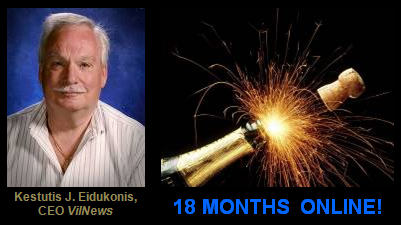
Dear VilNews Readers,
First of all, thanks to all of you for your kind words, suggestions, comments and support for VilNews. We have always felt very strongly about the wonderful potential of Lithuania in the world. It is a country of much beauty and fascinating multicultural history – a nation now represented in all corners of the world. We have been very pleased to provide a forum for a free, open and respectful dialogue about the past, present and future of Lithuania. The Staff and I have taken your advice to heart and decided to continue publishing VilNews and possibly also publishing a Lithuanian version of it. For this to occur we will need additional financial support.
We cannot continue to carry the full financial cost of publishing and disseminating VilNews on our own. We feel that all of us have a vested interest in the success of VilNews. In order to continue and expand this great publication we need your help.
If you can, please make a financial contribution to VilNews. At the present time we can only accept checks or money orders made out to UAB VilNews. Please write me if you consider contributing.
If you know of any business that should or could advertise in VilNews, please contact them. We are looking for sponsors and advertisers.
Please check your e-mail contact lists and suggest www.VilNews.com to all your friends who are interested in Lithuania. You would be surprised, how many of them have not heard of us. VilNews has also two different pages on Facebook, so go in and "like" us and participate in our ongoing debates.
I am sure that all of us working together can make VilNews even more successful than it already is.
Sincerely,
Kestutis J. Eidukonis
CEO VilNews
kestutis.eidukonis@VilNews.com
- Bookmark :
- Digg
- del.icio.us
- Stumbleupon
- Redit it
- Posted by - (6) Comment
New CEO of VilNews
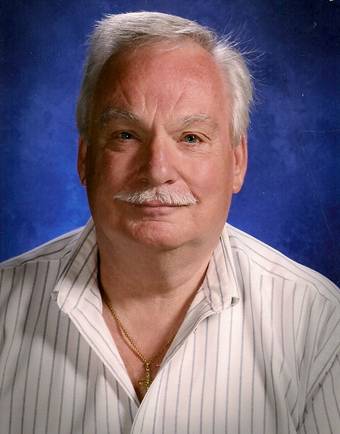
Kestutis J. Eidukonis
Dear readers,
I am today pleased to announce that Mr. Kestutis J. Eidukonis has accepted the position as CEO (Chief Executive Officer), of VilNews. As his family name suggests, Kestutis is of Lithuanian origin, though he has lived most of his life in the USA. Kestutis replaces Mr. Torben Pedersen as CEO for VilNews.
As CEO Kestutis will be responsible for the business aspects of VilNews, whereas I will continue to be responsible for all editorial aspects, as Editor-in-Chief.
Kestutis brings a wealth of experience from his life-long career(s). He can proudly look back at a brilliant career at the US Armed Forces, which brought him to work in many countries and in many roles, including being primary adviser in political and military affairs to the Commander-in-Chief of U.S. Southern Command (Latin and Central America). His successful military career can best be illustrated by the numerous decorations for outstanding performance he has received over the years.
Kestutis’ civil career is not less impressive. He has successfully managed the improvement or turn-around of over 500 small to medium size businesses ranging in annual revenue from $500,000 - $60 million. He has successfully advised several Russian and Eastern European firms endeavoring to do business with Western Countries, and he has worked extensively in Russia, the Baltics and Scandinavia. He has been teaching Entrepreneurship, Audio Video Technology, Electronic Journalism and Media communications, and lectured at AT&T's Global Business Program, East Stroudsburg University, School of the Americas, and the Air Force War College, as well as he has presented seminars on various business topics.
It’s without any doubt that Kestutis’ achievements, credentials, skills and experiences are outstanding and impressive. However, maybe most importantly, during the last couple of months, where I have learned to know Kestutis (also) as a person, I have noticed his strong feelings for Lithuania and Lithuanians, which I’m convinced has played an important role in his decision of accepting the position as CEO of VilNews.
He shares the vision of VilNews, to develop and maintain an e-publication that should be viewed as a good, strong, independent, democratic and outspoken Fourth Estate media in and for Lithuania, be critical of the negative that is still going on in this country, while increasingly trying to find positive stories and interesting angles on events and characteristics from both past and present, and to build bridges between Lithuania and its many extraordinary fine diasporas around the world.
You might claim that his decision was made by his heart rather than by his brain, however, as long as the brain is not completely disconnected, this is not a bad combination.
Let me also take the opportunity to thank Torben Pedersen for all the efforts he has put into VilNews…so far. Torben accepted the role as CEO in connection with the establishment of VilNews, as a temporary measure, however we all know that temporary arrangements, in the worst case, tend to become permanent, and in the best case, take longer than anticipated. I know that Torben is happy that Kestutis has accepted to take over as CEO, not for his own sake, but for the sake of VilNews. Torben is also a character that doesn’t care about titles or positions, however, I am convinced that Torben will work closely together with Kestutis in the future, that they will greatly supplement each other and constitute a great management team.
Please extend a hand and help Kestutis, Torben and I make VilNews a truly successful and wonderful reading experience for all lovers of Lithuania.
Aage Myhre
Editor-in-Chief
- Bookmark :
- Digg
- del.icio.us
- Stumbleupon
- Redit it
- Posted by - (20) Comment
Is there a future for VilNews?
 |
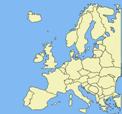 |
|
|
There will be no updates of VilNews e-magazine for |
||
By Aage Myhre, VilNews Editor-in-Chief
aage.myhre@VilNews.com
It seems, unfortunately, that we may have to stop publishing VilNews later this summerdue to lack of economic support and advertising from Lithuanian State, businesses and organizations, this despite the tremendous success we have had when it comes to worldwide readership and general interest.
Ideas and suggestions from you, dear readers who wouldn’t like to see this happen, would be very much appreciated.
When we went online with VilNews 16 months ago, the internet experts predicted that a ‘niche product’ like ours would probably attract no more than 10-15,000 readers per year. Today this is the number of readers we have per week (!), and we have till now welcomed close to 400,000 visitors from 181 countries; a tremendous success both with regards to readership and the great response we have had from Lithuanians and others from literally every corner of the globe. As far as I know, we are now the largest online publication from and about Lithuania in the world…
I have been told that we have more readers than all Lithuanian tourist brochures and presentations altogether.
I have been told that we have been doing more to connect global Lithuanians than all governmental institutions together…
If VilNews was printed on paper it would become a book of 7,000 pages, thicker than the Bible, making it the world’s largest and most comprehensive collection of, and source for, historical and contemporary information about the nation called Lithuania. This does, however, not impress the country’s State leaders or businesses.
When we have asked companies and the State authorities for economic support, the answer is either NO, or we get no answer at all (which is the most common ‘response’).
So far, we, the owners/shareholders, have subsidized the publishing, but I’m afraid our general meeting later this summer will be negative to do this much longer.
I think it would be sad if this enormous collection of Lithuania-related information would be lost, and I think it would be a sad day for our many readers who no longer will be getting their daily manna and access to a freestanding, democratic communication platform for good debates and the sharing of thoughts, memories and much more.
It would almost be like burning down a national library, wouldn’t it?
At the moment I am not very optimistic, but I would still be happy to hear if you, dear readers, have any ideas that could help keeping VilNews alive and online.
It is ten years since VilNews was established as a newsletter for VIC (Vilnius International Club – started 2001). Over the years, the newsletter got attention and readers from a worldwide audience far beyond the spheres of the club, and grew from having a few hundred readers to an estimated readership of more than
10,000 by the end of 2010.
Against this background, it was in September 2010 decided that VilNews should be separated from the club and established as a separate corporation and publisher, with the aim to turn the newsletter into an online e-magazine with a broad scope of issues and coverage.
VilNews e-magazine went online 15 February 2011, and has during the 16 months that have passed since then achieved a very solid, global success, now with close to 400,000 readers in no less than 181 countries!
Lithuanians around the world have united through VilNews. Thanks to you all, for the massive, wonderful feedback throughout the time we’ve spent together. I sincerely hope that this is not the end!
Kindest Regards,
Aage Myhre
Aage Myhre
VilNews Editor-in-Chief
Tel: +370 699 33 222
www.VilNews.com
aage.myhre@VilNews.com
|
|
||||||||||||
|
BELOW: A few out of many comments received regarding VilNews: ------------------------------------------------------------------------------------------------------------------------
----------------------------------------------------------------------------------------------------------------------- |
||||||||||||
|
|
An important, noble thing for the country Congratulations on the VilNews debut in this new, expanded format. It looks very good indeed, is highly informative, and I wish you much success with it. The sheer amount of effort and dedication that must have gone into getting this undertaking off the ground is quite awe-inspiring. You are doing an important, noble thing for the beautiful country you love. It is indeed an exceptionally interesting, genuinely fascinating country, with a turbulent past and difficult present -- a place that, despite (and in part, due to) the many still-unresolved issues of history, never is not-interesting, where "the past is not dead. It isn't even past," to quote Faulkner -- and as someone who also has been held under its thrall for many years, I share your desire to see as many people as possible the world over to discover it, come visit -- and fall in love with it, too, and keep coming back. My very best wishes to VilNews.
|
|||||||||||
|
|
We really needed something like this long ago Let me express my warmest greetings for such a wonderful job. I’m sure it will contribute a lot to creating a better image of Lithuania in the world. We really needed something like this long ago.
|
|||||||||||
|
|
Maintaining the pride of being Lithuanian We, at the National Lithuanian American Hall of Fame, are extremely appreciative of the superb job you did in prominently displaying our articles in your publication.
|
|||||||||||
|
|
Thank you for sending me VILNEWS. It is very well produced, informative and a very good read for me as I wish to stay in touch with Lithuania life and business. I receive the daily Baltic News but it is inferior to VILNEWS as it is always biased towards Latvia and has many mistakes in the English. VILNEWS is much more professional and absorbing.
|
|||||||||||
|
|
Good job with VilNews, actually a unique one globally! - Valdas Samonis PhD, CPC (USA - Canada),
|
|||||||||||
|
|
Far away from home, we need a publication different from the mainstream news portals Congratulations with VilNews! Far away from home, we need a publication different from the mainstream news portals, which are often permeated with negative attitude and serving narrow, short-term interests. Your interest to history and the international dimension of Lithuania has made your publication a very engaging reading. I trust VilNews will remain enthusiastic, honest and insightful. Please rest assured that you have a dedicated reader in Africa. - Paulius Kulikauskas, Nairobi, Kenya
|
|||||||||||
|
|
Your critical comments on, and wishes for, Lithuania in this issue are excellent I agree with every word, and can only hope that more Lithuanians would take your very informed, friendly, and insightful message to heart! I intend to translate most of your remarks, published in VilNews, into Lithuanian as part of my international press review this Wednesday. As I said before, I think your remarks are very valuable and reflect an enlightened attitude that should be broadcast as widely as possible to a Lithuanian audience. - Professor Mykolas J. Drunga, Broadcaster at Lithuanian State Radio
|
|||||||||||
|
Fundamental, personal values, sharp vision, continuous commitment, and hard work Some world leaders loud the phrases "yes we can" and "change you can trust (what change: good or bad?)"... However, what they fail to understand is that to achieve great results it takes fundamental, personal values, sharp vision, continuous commitment, and hard work. That is why they fail and You succeed!
|
||||||||||||
|
Professional looking site and highly informative publication. |
||||||||||||
|
|
||||||||||||
|
Immense damage after 50 years of oppression: You have seen it, recognized the problem and tried to repair the damage |
||||||||||||
|
|
The 50 years of communist oppression has done immense damage not only to the economy, but perhaps more so to the social fabric of our country. You have seen it, recognized the problem and tried to repair the damage. People who know you and respect you are grateful for all that you have done. You are needed, because you are making a difference and have so much more to give. I hope you will not allow the less than cordial atmosphere to stop the good that you are doing. Aage, I think that the good you make in the lives of very common people is what really counts. I urge you not to be discouraged and don’t give up doing the good that you are doing. The VilNews project is excellent. Warm Regards,
|
|||||||||||
|
More than all government bureaucrats together |
||||||||||||
|
|
You have truly done more service to your adopted country than all the government insensitive bureaucrats put together. You have 150,000 admirers in 114 countries. Close to 50,000 are living in Lithuania and reading VilNews with enthusiasm. Sincerely
|
|||||||||||
|
Most valuable and useful to and in Lithuania today |
||||||||||||
|
|
You have been an unprecedented star of optimism, the window of fresh air, and the bridge that Lithuania so badly needs to understand itself, where it stands in the world and how others see it. I have admired your attitude towards Lithuania and in many conversation used you as an example of what a man, even not a native to the country, can do voluntarily to raise Lithuania's image in contrast to the army of bureaucrats and consultants who achieved nothing upon spending millions for that purpose. It is so sad that the Lithuanian government and/or the politicians have not been able to raise their heads above the mock they are in, to recognize the immense contribution to the community dialog and Lithuania's visibility in the world you generated, that literally no money can buy. You have united through VILNEWS so many people from so many countries to a common purpose to share their thoughts and feelings on one issues that are dear to their hearts. It is unprecedented and no money can ever duplicate, because you have done it from your heart and soul. You are the most valuable and useful person to and in Lithuania today, even if those in power are blind to see and deaf to hear it. Dear Aage, please grow and nurture the VILNEWS, for it is better than any world news organization could ever produce. It is a beautiful and one of the most important gifts that anyone could have given to Lithuania. And we are immensely grateful to you for that. Best regards, Stan Backaitis
|
|||||||||||
|
Keep the good work going. I’m impressed. |
||||||||||||
|
|
Thanks for the newsletter. It has renewed my interest in Lithuania at a time when I am more involved in other countries. Keep the good work going. I'm impressed. Keith
|
|||||||||||
|
You are doing something that Lithuanian officials ought to do
|
||||||||||||
|
|
Dear Aage Myhre, I got the address of VilNews from my American friend. Best congratulations. You are again doing something that Lithuanian officials ought to do. Sincerely, |
|||||||||||
|
Pulling extraordinary minds & brains together for the purpose of “rescuing” Lithuania
|
||||||||||||
- Bookmark :
- Digg
- del.icio.us
- Stumbleupon
- Redit it
- Posted by - (6) Comment
As long as VilNews exists, there is hope for the future
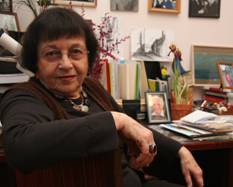 Dr. Irena Veisaite, Chairwoman of the VilNews Honorary Council |
Professor Irena Veisaite, Chairwoman of our Honorary Council, has asked us to convey her heartfelt greetings to the other Council Members and to all readers of VilNews.
“My love and best wishes to all. As long as VilNews exists, there is hope for the future,” she writes. Irena Veisaite means very much for our publication, and we do hereby thank her for the support and wise commitment she always shows. You can read our interview with her HERE. |
- Bookmark :
- Digg
- del.icio.us
- Stumbleupon
- Redit it
- Posted by - (0) Comment
 |
 ONE YEAR ONLINE! |
VilNews Honorary Council!
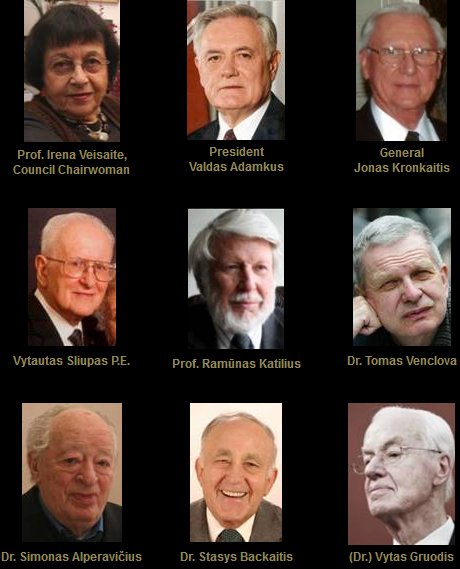
By: Aage Myhre, Editor-in-Chief
aage.myhre@VilNews.com
Dear VilNews readers,
We are today proud to present you to our ‘Honorary Council’ – composed of distinguished individuals, all born in Lithuania before World War II, all having extraordinary lives and careers – some in Lithuania, some in exile due to the Soviet occupation of their motherland.
The members of the Honorary Council, wish to contribute, embody, and set standards that enhance the progress and development of Lithuania as a great nation based on dignity, wisdom, tolerance, multiculturalism, and respect for each other.
Lithuania is today a free and independent nation with norms, values, and visions that are deeply rooted in our country’s long and proud history, and it is these outstanding qualities that define the country and our people as the nation called Lithuania. These are the traits that have made Lithuania a great, progressive, and prosperous force in human history.
Now our nation needs to pull together so that we can confront boldly the challenges we face and take responsibility for our own future again.
The dignitaries participation in the Honorary Council does not imply that they, either as a group or as individuals, necessarily agree with all of the opinions the publication’s editorial staff, readers, and other parties may express in articles, comments, or other published content, but they do affirm and advocate freedom of the press, speech, and other forms of legitimate expression as among the inviolable rights of a democratic Lithuania, based on the ethical standards outlined in the publication’s own “Code of Ethics” (ref VilNews Section 3).
They encourage Lithuanians and readers around the world to express their opinions and views through VilNews with the common goal of contributing to a better and more prosperous future for the worldwide Lithuanian community and the nation called “Lithuania!”
Irena Veisaite – Valdas Adamkus – Jonas Kronkaitis – Stasys Backaitis
Vytautas Slliupas – Tomas Venclova – Romas Katilius – Siminoas Alperavicius – Vytas Gruodis
TO READ MORE, GO TO OUR SECTION 2
* * *
VilNews became an online e-publication
15th of February 2011
* * *
Today: 250.000 readers in 175 countries
in absolutely all world corners!
* * *
If VilNews was printed on paper, it would become
a book of more than 6.000 pages
* * *
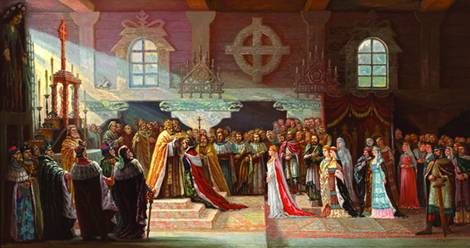
Coronation of King Mindaugas, Lithuania’s first and only king, 6 July 1253.
“The Coronation of King Mindaugas” is the only historical picture out of half a
thousand works that were painted by Adomas Varnas (1879-1979). Varnas was
Lithuanian, a graduate of the Krakow Academy of Fine Arts and the Geneva
High School of Painting, and lived abroad most of his life. He worked on
the painting of King Mindaugas in Chicago, USA. The size of the picture is
1,65 m x 1,3 m. It portrays the climactic scene of the King’s coronation.
Varnas painted the canvas when he was over 70 years of age, in 1952.
He consulted several scientists to avoid historical mistakes.
VilNews went online 15 February 2011. Our goal was to get 100,000 visitors in one year. This target was reached already after six months, and now, after one year, we are very pleased to announce that we have reached 250,000 visitors – one quart million readers in no less than 175 countries! Around 1,000 persons are now reading VilNews every single day, a new reader every 1,5 minute in other words…
Experts told us in advance that a ‘niche product’ like this could expect a readership of 10,000 – 15,000 per year. Skeptics said that we were too optimistic. They were thoroughly wrong …
VilNews is a unique combination of blogs, news, historical articles, etc – a news media and social media under same umbrella, including a huge information base providing background articles on history, politics, economy and much more.
As far as we know VilNews is now the world’s most comprehensive online presentation of Lithuania and Lithuanian topics, be it with regard to history, politics, economy, culture, tourism and more. Had VilNews been printed on paper it would be a book of more than 6,000 pages, thicker than the Bible, Old and New Testament together.
To make reading easier, we have divided VilNews into 24 specialty sections. Below we have described them all. To get to the sections you can now today simply press the LEARN MORE buttons to the right, but normally you have to use the buttons on top of the front page of VilNews.
Note also the search box at the top of the front page. Enter any keyword and click SEARCH to find articles from our very extensive archive.
- Bookmark :
- Digg
- del.icio.us
- Stumbleupon
- Redit it
- Posted by - (3) Comment
Welcome to readers in
20 new countries!
VilNews keeps getting new readers in ever more countries. Since October, twenty new countries have ‘signed up’. It's incredibly exciting to see that Lithuania and ‘the Lithuanian’ is becoming increasingly better known in all corners of the world. We wish all our new readers welcome!
You are all invited to send us news and other matters that are related to Lithuania in the country or region where you live!
|
|
CAYMAN ISLANDS |
|
MALI |
|
|
EL SALVADOR |
|
GAMBIA |
|
|
TOGO |
|
MAURITIUS |
|
|
YEMEN |
|
ARUBA |
|
|
ANTIGUA & BARBUDA |
|
BARBADOS |
|
|
MACAU |
|
NAMIBIA |
|
|
BURKINA FASO |
|
VIRGIN ISLANDS |
|
|
DOMINICAN REPUBLIC |
|
BERMUDA |
|
|
JAMAICA |
|
GUAM (USA) |
|
|
BAHRAIN |
|
ZAMBIA |
- Bookmark :
- Digg
- del.icio.us
- Stumbleupon
- Redit it
- Posted by - (6) Comment
The power of words
This short film illustrates the power of words to radically change your message and your effect upon the world.
Homage to Historia de un letrero, The Story of a Sign by Alonso Alvarez Barreda Music by: Giles Lamb http://www.gileslamb.com Filmed by www.redsnappa.com Director Seth Gardner. Cast: Bill Thompson, Beth Miller http://www.uk.castingcallpro.com/view.php?uid=217905
VilNews: Almost 200,000 visitors in only nine months!
Speaking of the word power: Our VilNews e-magazine has now been online for nine months. When we started the experts said that we probably would reach a readership of around 10 to 15,000 per year. It is therefore with great pleasure we can reveal that we already are approaching 200,000 visits, an incredibly large and gratifying number! We thank you, dear readers, for the enormous interest you are showing VilNews every single day!
- Bookmark :
- Digg
- del.icio.us
- Stumbleupon
- Redit it
Pulling extraordinary minds & brains together for the purpose of ‘rescuing’ Lithuania
- Posted by - (6) Comment
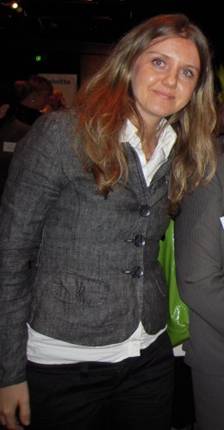 |
I have been reading some of the most interesting articles since the VilNews launch. There was one, in particular, that touched and impressed me deeply, it was an Oxfordian view on Lithuania's education. However, what has impressed me the most is the fact that you have been able to pull extraordinary 'minds & brains' together from all over the world for the purpose of 'rescuing' Lithuania as a nation, and fundamentally improve its current practices with respect to economic and political justice, business practices, educational sustainability and resilience and much, much more. Just wanted to say one more time THANK YOU!!!
|
“What has impressed me the most is the fact that you have been able to pull extraordinary 'minds & brains' together from all over the world for the purpose of 'rescuing' Lithuania as a nation, and fundamentally improve its current practices with respect to economic and political justice, business practices, educational sustainability and resilience and much, much more.”
- Bookmark :
- Digg
- del.icio.us
- Stumbleupon
- Redit it
VilNews e-magazine is published in Vilnius, Lithuania. Editor-in-Chief: Mr. Aage Myhre. Inquires to the editors: editor@VilNews.com.
Code of Ethics: See Section 2 – about VilNews. VilNews is not responsible for content on external links/web pages.
HOW TO ADVERTISE IN VILNEWS.
All content is copyrighted © 2011. UAB ‘VilNews’.

 Click on the buttons to open and read each of VilNews' 18 sub-sections
Click on the buttons to open and read each of VilNews' 18 sub-sections 


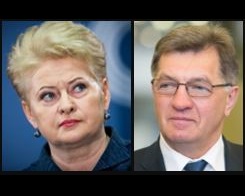






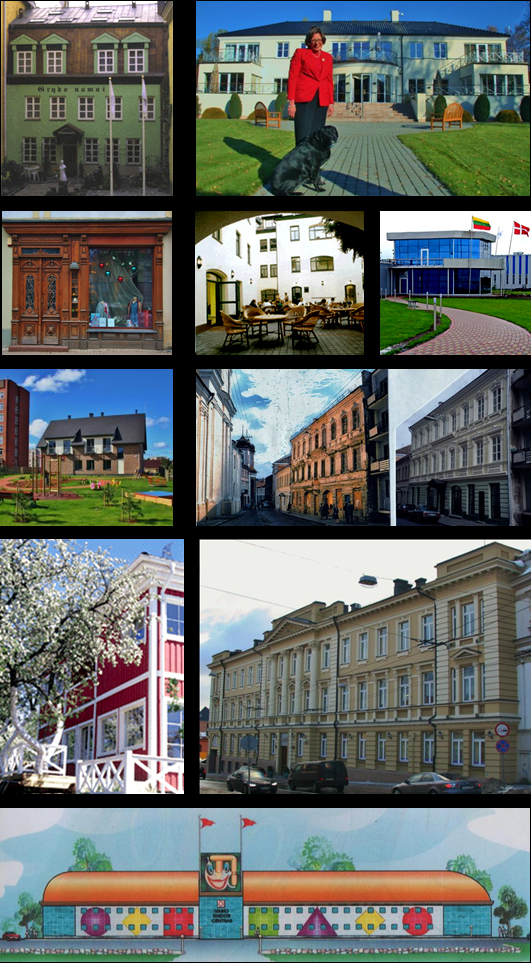













































.jpg)



